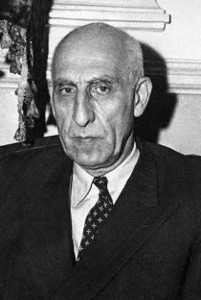
Sixty years to the day after a CIA-backed coup toppled Prime Minister Mohammad Mossadegh, a trove of CIA documents on the coup was finally published on the Internet—but British pressure may be holding back still more documents that show the UK role in the coup.
The new documents contained little information than had not already been revealed over the decades and did not change any major interpretations.
For the first time, however, they included a flatout pronouncement of the CIA’s involvement contained in an official CIA history of the 1953 coup. However, given everything that had leaked out over the years, that provided a mere footnote. No one has ever doubted the CIA’s involvement; what is still debated is how crucial that involvement was to the outcome.
Furthermore, in 1999, then US Secretary of State Madeleine Albright publicly acknowledged –and apologized for—the US role in the coup. She was responding to hints from Iran that the regime might be more cooperative if the United States would ‘fess up to its past interference in Iran. However, the Islamic Republic largely ignored Albright’s confession and apology and instead complained bitterly about another portion of her statement in which she said the Islamic Republic was ruled by a handful of un-elected people.
The admission of the US role comes in a single, but unqualified, sentence in an in-house history written by the CIA in the 1970s: “The military coup that overthrew Mossadegh and his National Front cabinet was carried out under CIA direction as an act of US foreign policy.”
The documents were obtained from the CIA by the Washington-based National Security Archive, a private group that uses the US Freedom of Information Act to leverage documents out of the US government agencies. The new documents were posted Monday on the Archive’s website, http://www2.gwu.edu/~nsarchiv/index.html, along with an analysis written by Malcolm Byrne, deputy director of the Archive, which is hosted at George Washington University.
That analysis noted that there were still holes in the public record, especially related to Britain’s involvement, and suggested that British reticence—and pressure on the US—is the main reason documents that the CIA was prepared to release decades ago still have not been published.
Byrne noted that the CIA was perfectly willing to release the internal history that says flat-out that the CIA engineered the coup. He said, “This suggests that ongoing CIA inflexibility [about releasing other coup records] is not so much a function of the agency’s worries about its own role being exposed as a function of its desire to protect lingering British sensitivities about 1953—especially regarding the activities of UK intelligence services.”
Byrne writes, “The British government’s apparent unwillingness to acknowledge what the world already knows is difficult for most outsiders to understand. It becomes positively baffling when senior public figures who are fully aware of the history have already acknowledged London’s role.
“In 2009, former Foreign Secretary Jack Straw publicly remarked on Britain’s part in toppling Mossadegh, which he categorized as one of many outside ‘interferences’ in Iranian affairs in the last century. Yet, present indications are that the UK government is not prepared to release either its own files or evidently to approve the opening of American records that might help bring some degree of closure.”
The Archive says the documents published this week are not the full history and “still leave wide gaps in the history, including on some fundamental questions which may never be satisfactorily answered — such as how to apportion responsibility for planning and carrying out the coup among all the Iranian and outside actors involved.”
The documents also do not shed light on the reasons for the US pursuing the coup. That decision, of course, was made in the White House, not in the CIA.
Most histories agree that Britain proposed the coup plot to Washington to stop a feared Soviet advance in the Middle East and that President Harry S. Truman refused to agree to the coup, seeing it as little more than a British ploy to regain control of Iranian oilfields. When Dwight Eisenhower became president a few months later, the British forwarded the idea again and the new Administration, dedicated to turning back the tide of communism, quickly agreed.
In Tehran this week, however, the state media seemed wedded to the idea that the Americans promoted the coup as part of a capitalist plot to get America’s hands on Iranian oil.